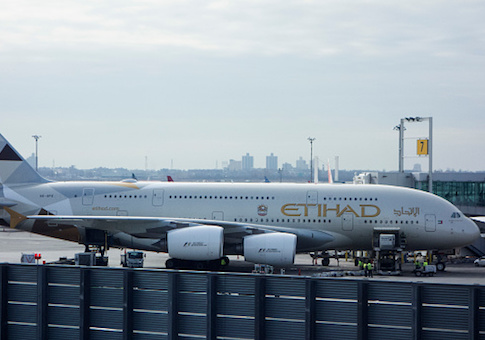Rep. John Katko (R., N.Y.) lauded the Trump administration's decision this week to prohibit passengers from airports in eight Middle Eastern and North African countries from carrying electronic devices larger than a cellphone aboard direct flights to the United States.
Katko, chairman of the House Subcommittee on Transportation Security, said the new regulation will enhance U.S. security and better protect the travelling public, particularly in light of U.S. intelligence suggesting that al Qaeda has developed a bomb to be concealed in portable electronics.
"Unfortunately, American travelers are often the target of bad guys abroad. This will keep them safer," Katko said.
The Department of Homeland Security issued the restriction Tuesday morning requiring passengers to place laptops, tablets, cameras, and larger electronic devices in checked baggage at 10 airports when flying to the United States. Officials said passengers can still carry cellphones aboard.
The Trump administration said the new policy is not based on a specific or imminent threat. Officials said it reflected general intelligence showing an ongoing desire by terrorists to penetrate flights emanating from the affected region.
The United Kingdom announced it would enforce similar restrictions just hours after DHS released its policy. Katko said he "fully expects" many other countries will take similar actions.
The U.S. ban applies to flights from some airports in Egypt, Jordan, Kuwait, Morocco, Saudi Arabia, Turkey, Qatar, and the United Arab Emirates. The rules took effect immediately and airlines have until 3 a.m. Saturday to comply. Companies that refuse to adopt the restrictions could be barred from flying to the United States.
A Somali suicide bomber in February 2016 built an explosive device into the battery of a laptop that was brought on an airliner out of Mogadishu. The explosion did not down the plane, but authorities said it would have caused catastrophic damage had it been detonated at cruising altitude. DHS also cited in its announcement claims by ISIS in October 2015 that it downed a Russian passenger jet with an explosives-laden soda can.
David Inserra, a homeland security analyst at the Heritage Foundation, said al Qaeda in the Arabian Peninsula is known for its innovative bomb-making techniques that include attempts to hide explosives in laptops.
"AQAP is on the cutting edge of how to smuggle bombs to get to the targets they're after," Inserra told the Free Beacon.
"The TSA and DHS are looking to minimize the threat by saying if this is an avenue that terrorists are looking to exploit, we're going to make it harder for them to do so by requiring those devices to not be immediately accessible to a potential terrorist," he said.
The DHS did not respond to multiple requests for comment. White House Press Secretary Sean Spicer declined to address the intelligence that inspired the new restriction during a media briefing Tuesday.
